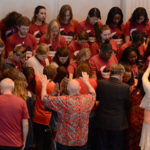When the last immigrant children left a shelter at Lackland Air Force Base in San Antonio Aug. 9, the largest and longest-lasting emergency response in the history of BCFS came to an end.
 An unaccompanied immigrant child held in a Border Patrol-run facility early this summer. (U. S. Customs and Border Protection Photo: Eduardo Perez)In 134 days, BCFS, the agency formerly known as Baptist Child & Family Services, cared for about 8,000 Central American children at the San Antonio shelter and another facility at Fort Sill in Oklahoma. The effort involved more than 1,400 workers—including medical personnel, teachers, direct-care staff and pastors, as well as behind-the-scenes support and management personnel.
An unaccompanied immigrant child held in a Border Patrol-run facility early this summer. (U. S. Customs and Border Protection Photo: Eduardo Perez)In 134 days, BCFS, the agency formerly known as Baptist Child & Family Services, cared for about 8,000 Central American children at the San Antonio shelter and another facility at Fort Sill in Oklahoma. The effort involved more than 1,400 workers—including medical personnel, teachers, direct-care staff and pastors, as well as behind-the-scenes support and management personnel.
The operation also made about $280 million in federal funds available to BCFS Health & Human Services, the nonprofit agency’s domestic social services arm, for reimbursed expenses. However, the agency actually received about half that amount this year, since the shelter operation did not continue as long as originally projected, said Kevin Dinnin, BCFS chief executive officer.
BCFS Health & Human Services and its emergency management division are part of the BCFS system, which also includes Breckenridge Village of Tyler, a residential community for adults with mild to moderate mental disabilities; Children’s Emergency Relief International, the system’s global humanitarian division; Silvercliff Ranch, a retreat center in Colorado; and the South Texas Centre, a campus for nonprofit community resources in San Antonio.
 Kevin DinninAs the parent umbrella organization for the system, BCFS holds no contracts with any government agency, said Krista Piferrer, the agency’s executive vice president for external affairs. BCFS provides “back-end support,” such as accounting, human resource management, information technology, facility management and communications, to its subsidiary corporations and other nonprofits, she explained.
Kevin DinninAs the parent umbrella organization for the system, BCFS holds no contracts with any government agency, said Krista Piferrer, the agency’s executive vice president for external affairs. BCFS provides “back-end support,” such as accounting, human resource management, information technology, facility management and communications, to its subsidiary corporations and other nonprofits, she explained.
“BCFS subsidiary corporations are funded through philanthropy from individuals, corporations, foundations and fee-for-service arrangements, which includes partnerships with local, state and federal government entities across the nation,” Piferrer said.
The complex global human services system stands in sharp contrast to the small Mexican Baptist Orphans Home of Texas—the children’s home Texas Baptists founded in San Antonio 70 years ago—that eventually grew into BCFS.
“If we were the kind of organization we used to be, we couldn’t have done it,” Dinnin said, referring to the child immigrant sheltering operation.
‘No other agency’ able to carry out the mission
Sign up for our weekly edition and get all our headlines in your inbox on Thursdays
When federal authorities needed an agency to provide care for an unexpected surge of immigrant children from Central America, they contacted BCFS because it was a job “no other agency in the nation—whether government or private company—was able to carry out,” Piferrer insisted.
 Krista PiferrerIn recent years, the BCFS emergency management division emerged as one of the leading responders nationally during disasters, operating specialized shelters in the wake of hurricanes, tornados and public health emergencies.
Krista PiferrerIn recent years, the BCFS emergency management division emerged as one of the leading responders nationally during disasters, operating specialized shelters in the wake of hurricanes, tornados and public health emergencies.
And during the 130-plus days the BCFS system operated shelters for unaccompanied minor immigrants, it ranked as the top recipient of money provided to contractors who provided the service for the government—a fact that attracted national media attention, particularly in light of the agency’s historic relationship to Texas Baptists.
“As a nonprofit organization, any surplus funds within the BCFS system are invested back into our mission,” Piferrer said. “Since most government contracts held by our subsidiary corporations are based on cost-reimbursement and can be stringent with allowable expenses, donations and other nongovernmental revenue allow BCFS to subsidize or fully underwrite programs that serve those in need.”
BCFS remains affiliated with the Baptist General Convention of Texas, but contributions from the state convention account for less than 1 percent of the BCFS system’s $103 million annual budget. Federal, state and local government funds provide $83 million—about 20 percent—of the total through fee-for-service contracts with three BCFS subsidiaries.
 BCFS has been involved in providing shelters for immigrant children since the U.S. Department of Health & Human Services contacted the agency in 2007, and the 2014 budget projected $71 million for the ongoing program, Dinnin noted.
BCFS has been involved in providing shelters for immigrant children since the U.S. Department of Health & Human Services contacted the agency in 2007, and the 2014 budget projected $71 million for the ongoing program, Dinnin noted.
When the surge of immigrant children occurred, the federal government made additional funding available for cost-reimbursement—up to about $210 million. But actual costs beyond the BCFS budget totaled about $74 million, he said.
That included around-the-clock staffing at the shelters, including behavioral specialists, medical personnel and educators, as well as about 5,000 meals a day.
“We handled a half-million pounds of laundry,” Dinnin noted.
Religious services
During the time it sheltered unaccompanied minor immigrants, BCFS provided religious services at its shelters for young people who wanted to participate, and it offered Bibles to any who wanted them.
“Our faith is at the heart of everything we do,” Dinnin said.
Dan Trevino, associate pastor of Baptist Temple in San Antonio, led worship services at Lackland AFB, where the Roman Catholic archbishop of San Antonio also presided over masses. At Fort Sill, a nearby Catholic church and a nondenominational Protestant church offered Sunday worship services.
“Like other faith-based nonprofits, BCFS’s subsidiary corporations follow the federal government’s charitable choice guidelines, which allow freely sharing biblical values with those it serves who seek spiritual growth and guidance, but never forcing religious participation,” Piferrer said.
When it comes to providing social services, the wall of separation between church and state often appears somewhat permeable, particularly since the government depends on nonprofit entities—many of them faith-based—to fulfill its constitutional mandate to “promote the general welfare.”
Church-state separation questions
Without commenting on the specifics regarding BCFS and the shelters for immigrant children, Holly Hollman, general counsel for the Baptist Joint Committee, offered general observations on government partnerships with faith-based organizations, particularly in light of a November 2010 executive order by President Barack Obama.
“Specifically, organizations are forbidden from engaging in ‘explicitly religious’ activities in the course of a program that receives direct federal financial assistance,” she noted.
“Such activities by religious organizations that receive federal financial assistance must be separated in time and place from the government-funded activity. While the executive order maintains protection of the character of faith-based organizations, allowing them to compete and participate in federal funding programs without changing their name or impairing their independence, it notes that their religious expression is protected outside the government-funded program.
“In other words, and consistent with long-standing standards, an organization is not prevented from competing for or receiving federal money just for being religious. The government program, however, must not include religious content.”
The shelters BCFS Health & Human Services operated complied fully with the government guidelines, Dinnin said.
“We believed the children should have access to pastoral care, spiritual care and worship opportunities,” he said. But the parent organization, BCFS, purchased the Bibles it made available to young people and bore all costs for the worship services—not any BCFS subsidiary that received federal funds, he explained.
Two categories
Religiously affiliated social-service providers fit into two general categories. For-pay providers receive government funds, and no-pay providers do not. But sometimes, one agency within a human care system may operate as for-pay, while another serves as a no-pay provider.
Among BGCT-related institutions that work in foster care, for instance, Buckner Children & Family Services and BCFS are for-pay providers. Two of the BGCT-related agencies that provide care for children and minister to families—South Texas Children’s Home Ministries and Texas Baptist Children’s Home—are no-pay providers that accept no state or federal funds. But one sister agency of Texas Baptist Children’s Home under the Children at Heart Ministries umbrella, STARRY, is a for-pay provider; however, it depends on donors for part of its work.
To further complicate matters, subsidiaries within the BCFS system not only provide ongoing social services such as foster care, but also emergency response and incident management in times of disaster—often working as a contracting agency with county, state or federal entities.
Texas Baptist Men
In contrast, Texas Baptist Men—the state missions organization that pioneered disaster relief ministry among Southern Baptists—does not depend on government funding, TBM Executive Director Don Gibson said.
For three weeks, TBM worked in cooperation with Border Patrol to provide showers and laundry service for unaccompanied minors detained in a facility at Fort Brown. Subsequently, TBM made mobile shower units available to ministries that continue to serve immigrant families in McAllen and Laredo.
“We are not receiving any federal, state or county money now and do not expect to in the future. The funds used to assist people come out of our disaster relief budget, which is supported through gifts of individuals and churches,” Gibson said.
EDITOR’S NOTE: The 5th paragraph from the end was revised after it originally was posted to clarify the “for-pay” or “no-pay” status of BGCT-affiliated human services providers.














We seek to connect God’s story and God’s people around the world. To learn more about God’s story, click here.
Send comments and feedback to Eric Black, our editor. For comments to be published, please specify “letter to the editor.” Maximum length for publication is 300 words.